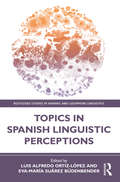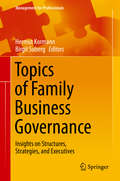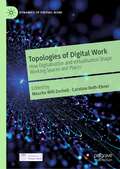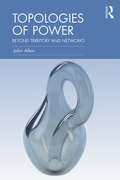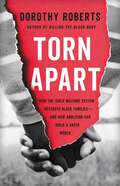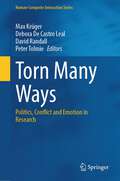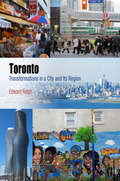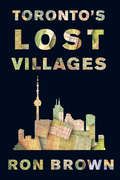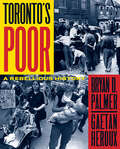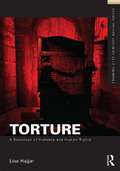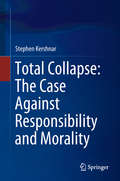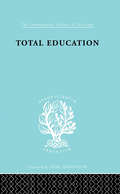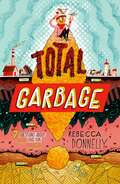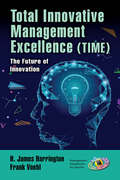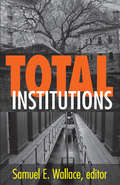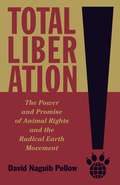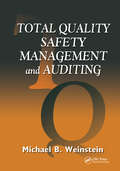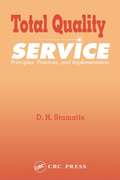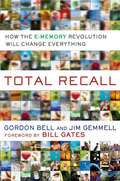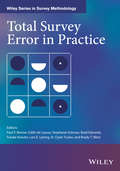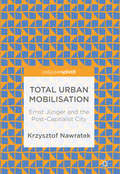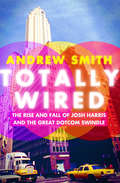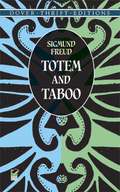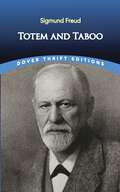- Table View
- List View
Topics in Spanish Linguistic Perceptions (Routledge Studies in Hispanic and Lusophone Linguistics)
by Ortiz-López, Luis AlfredoTopics in Spanish Linguistic Perceptions brings together the most current research on linguistic perceptions of varieties of Spanish. The book includes articles from a range of expert contributors using different methodologies and looking at diverse sociolinguistic settings. Readers will gain a rich understanding of the importance of linguistic perceptions and the societal attitudes they are linked to. Readers will also gain insight into the interplay between socioeconomic groups, and educational and linguistic norms and the perception of non-standardized forms of Spanish. The volume highlights the relationship between language and social perceptions and will be of particular interest to researchers and students in Hispanic linguistics, sociophonetics, and sociolinguistics.
Topics of Family Business Governance: Insights on Structures, Strategies, and Executives (Management for Professionals)
by Hermut Kormann Birgit SubergThis book focuses on the role of the board in family businesses and specifically on processes and topics of strategic importance. It comprises all the relevant topics which need to be addressed on a regular basis such as strategy development, financial management, and leadership. The pros and cons of each issue are elaborated. This is one of the few books which addresses family businesses from governance systems to the role of executives. The diverse set of examples carefully collected by the authors and an in-depth discussion on the topics provide readers with valuable insights to broaden and enrich the effectiveness of governance.
Topologies of Digital Work: How Digitalisation and Virtualisation Shape Working Spaces and Places (Dynamics of Virtual Work)
by Mascha Will-Zocholl Caroline Roth-EbnerThis book provides a unique contribution to the controversial discussion that surrounds the digitalisation and virtualisation of work. With a focus on the new formation of space and place, it critically discusses the idea that places in the context of work are increasingly losing their importance, and becoming more arbitrary with new technical possibilities. Theoretical considerations that deal conceptually with the understanding of space and work are taken into account, as well as empirical results from different professional and work fields across various regions of our globalised world. The book is applicable to researchers and students of sociology of work, media and communications, organization studies, workplace studies, labour process studies, economics, human geography, anthropology and learning sciences.Chapter 1, 4 and 11 are available open access under a Creative Commons Attribution 4.0 International License via link.springer.com.
Topologies of Power: Beyond territory and networks (CRESC)
by John AllenTopologies of Power amounts to a radical departure in the way that power and space have been understood. It calls into question the very idea that power is simply extended across a given territory or network, and argues that power today has a new found ‘reach’. Topological shifts have subtly altered the reach of power, enabling governments, corporations and NGOs alike to register their presence through quieter, less brash forms of power than domination or overt control. In a world in which proximity and distance increasingly play across one another, topology offers an insight into how power remains continuous under transformation: the same but different in its ability to shape peoples’ lives. Drawing upon a range of political, economic and cultural illustrations, the book sets out a clear and accessible account of the topological workings of power in the contemporary moment. It will be invaluable for both students and academics in human geography, politics, sociology, and cultural studies.
Torn Apart: How the Child Welfare System Destroys Black Families--and How Abolition Can Build a Safer World
by Dorothy RobertsAn award-winning scholar exposes the foundational racism of the child welfare system and calls for radical change Many believe the child welfare system protects children from abuse. But as Torn Apart uncovers, this system is designed to punish Black families. Drawing on decades of research, legal scholar and sociologist Dorothy Roberts reveals that the child welfare system is better understood as a &“family policing system&” that collaborates with law enforcement and prisons to oppress Black communities. Child protection investigations ensnare a majority of Black children, putting their families under intense state surveillance and regulation. Black children are disproportionately likely to be torn from their families and placed in foster care, driving many to juvenile detention and imprisonment. The only way to stop the destruction caused by family policing, Torn Apart argues, is to abolish the child welfare system and liberate Black communities.
Torn Many Ways: Politics, Conflict and Emotion in Research (Human–Computer Interaction Series)
by David Randall Peter Tolmie Max Krüger Debora De Castro LealThis edited collection brings together a range of experiences from the field, largely in the context of CSCW and HCI. It focuses specifically on the experiences of people who have worked in difficult, tense, delicate and sometimes conflictual and dangerous settings. The tensions faced by researchers and, more importantly, how they manage to deal with them are often under-remarked. Unlike the bulk of published ethnographic work, the chapters in this book deal more explicitly with the various practical problems that researchers with varying degrees of experience face. Our aim in this book is to give a voice to researchers who have sometimes contended with unexpected issues and who sometimes have had to face them on their own. We explore incidents which may entail emotional conflict, embarrassment and shame, feelings of isolation, arguments with other members of a team, political pressures, and ideological confusions, to name but a few. Senior figures in research laboratories and elsewhere may provide intellectual direction and support but may not always recognise the personal and problematic nature of qualitative enquiry undertaken by relatively inexperienced researchers. The chapters examine feelings of isolation, the difficulty of ‘taking sides’, the negotiation of personal, ethical, and political pressures in the field, and dealing with conflicting visions of what the research should be about. The book is a resource for those embarking on the challenges of working in unfamiliar or difficult settings and moreover should act as a reminder to academics who might have forgotten the practical issues that researchers can face and how they deal with them.
Toronto
by Edward RelphExtending a hundred miles across south-central Ontario, Toronto is the fifth largest metropolitan area in North America, with the highest population density and the busiest expressway. At its core old Toronto consists of walkable neighborhoods and a financial district deeply connected to the global economy. Newer parts of the region have downtown centers linked by networks of arterial roads and expressways, employment districts with most of the region's jobs, and ethnically diverse suburbs where English is a minority language. About half the population is foreign-born--the highest proportion in the developed world. Population growth because of immigration--almost three million in thirty years--shows few signs of abating, but recently implemented regional strategies aim to contain future urban expansion within a greenbelt and to accommodate growth by increasing densities in designated urban centers served by public transit.Toronto: Transformations in a City and Its Region traces the city's development from a British colonial outpost established in 1793 to the multicultural, polycentric metropolitan region of today. Though the original grid survey and much of the streetcar city created a century ago have endured, they have been supplemented by remarkable changes over the past fifty years in the context of economic and social globalization. Geographer Edward Relph's broad-stroke portrait of the urban region draws on the ideas of two renowned Torontonians--Jane Jacobs and Marshall McLuhan--to provide an interpretation of how its current forms and landscapes came to be as they are, the values they embody, and how they may change once again.
Toronto's Lost Villages
by Ron BrownExplore the vestiges of the hamlets and villages that have been swallowed up by Toronto’s relentless growth. Over the course of more than two centuries, Toronto has ballooned from a muddy collection of huts on a swampy waterfront to Canada’s largest and most diverse city. Amid (and sometimes underneath) this urban agglomeration are the remains of many small communities that once dotted the region now known as Toronto and the GTA. Before European settlers arrived, Indigenous Peoples established villages on the shore of Lake Ontario. With the arrival of the English, a host of farm hamlets, tollgate stopovers, mill towns, and, later, railway and cottage communities sprang up. Vestiges of some are still preserved, while others have disappeared forever. Some are remembered, though many have been forgotten. In Toronto’s Lost Villages, all of their stories are brought back to life.
Toronto’s Poor: A Rebellious History
by Bryan D. Palmer Gaétan HérouxToronto’s Poor reveals the long and too often forgotten history of poor people’s resistance. It details how people without housing, people living in poverty, and unemployed people have struggled to survive and secure food and shelter in the wake of the many panics, downturns, recessions, and depressions that punctuate the years from the 1830s to the present. Written by a historian of the working class and a poor people’s activist, this is a rebellious book that links past and present in an almost two-hundred year story of struggle and resistance. It is about men, women, and children relegated to lives of desperation by an uncaring system, and how they have refused to be defeated. In that refusal, and in winning better conditions for themselves, Toronto’s poor create the possibility of a new kind of society, one ordered not by acquisition and individual advance, but by appreciations of collective rights and responsibilities.
Torture: A Sociology of Violence and Human Rights (Framing 21st Century Social Issues)
by Lisa HajjarTorture is indisputably abhorrent. Why, you might ask, would you even want to think or read about torture? That is a very good question, and one this book addresses in a compelling and enlightening way. Torture is a very important issue, not least because millions of people around the world have been subjected to this odious practice—and many are enduring torture right now as you read these words.
Total Collapse: The Case Against Responsibility and Morality
by Stephen KershnarThis book argues that there is no morality and that people are not morally responsible for what they do. In particular, it argues that what people do is neither right nor wrong and that they are neither praiseworthy nor blameworthy for doing it. Morality and moral responsibility lie at the heart of how we view the world. In our daily life, we feel that people act rightly or wrongly, make the world better or worse, and are virtuous or vicious. These policies are central to our justifying how we see the world and treat others. In this book, the author argues that our views on these matters are false. He presents a series of arguments that threaten to undermine our theoretical and practical worldviews. The philosophical costs of denying moral responsibility and morality are enormous. It does violence to philosophical positions that many people took a lifetime to develop. Worse, it does violence to our everyday view of people. A host of concepts that we rely on daily (praiseworthy, blameworthy, desert, virtue, right, wrong, good, bad, etc.) fail to refer to any property in the world and are thus deeply mistaken. This book is of interest to philosophers, lawyers, and humanities professors as well as people interested in morality, law, religion, and public policy.
Total Education: A Plea for Synthesis (International Library of Sociology)
by M.L. JacksFirst Published in 1998. Routledge is an imprint of Taylor & Francis, an informa company.
Total Garbage: A Messy Dive into Trash, Waste, and Our World
by Rebecca DonnellyTotal Garbage by Rebecca Donnelly dives into the messy truth about trash, garbage, waste, and our world—it's a fact-filled and fascinating illustrated middle grade environmental read!Trash has been part of human societies since the beginning. It seems like the inevitable end to the process of making and using things—but why? In this fascinating account of the waste we make, we'll wade into the muck of history and explore present-day STEM innovations to answer these important questions: What is garbage?Where does our garbage come from?Why do we make so much garbage?Where does our garbage go?What can we learn from our garbage?How bad is our garbage problem?How can we do better?Rebecca Donnelly tackles the extraordinary, the icky, and the everyday, helping us see how our choices, personal and societal, impact our world and our planet—and encouraging us make a change.Back matter includes a timeline of the history of waste management, selected bibliography, and index."clear, engaging writing. . . [and] whimsical, informative, detailed teal-tone line drawings add to a captivating and important book. . . A fact-filled and fascinating dumpster dive of a book." —Kirkus Reviews, starred review on Total Garbage"this book makes garbage fun to read about and is a great choice for browsable nonfiction shelves and curricular tie-ins" —School Library Journal on Total Garbage"Readers will need strong stomachs for some of the nauseating facts Donnelly dishes in her deep dumpster dive, but they’ll emerge a heartier lot that’s armed with awareness and the tools to clean up their acts, environmentally speaking. " —Booklist on Total Garbage
Total Innovative Management Excellence: The Future of Innovation (Management Handbooks for Results)
by H. James HarringtonDr. H. James Harrington and Frank Voehl have gathered together the thoughts and ideas of more than 20 of the most creative innovation thought leaders from business, professional practice, and academia in this compelling book. The thought leaders look at innovation from almost every angle – their statements offer an unparalleled view of innovation and provide a depth of insight that is extraordinary. Harrington and Voehl’s reflection on each chapter, and on the sections within the book, provides useful links between themes and reinforces the relationships between many of the ideas. Anyone interested in innovation (practitioner or researcher) will benefit from this global thought collection. The contributors' multiple perspectives, models, practical examples, and stories provide a sense of innovation that no single writer could ever capture. A company’s future growth will only come through successful innovation. This book is organized around Dr. Harrington's innovation pyramid, which consists of the 16 building blocks required to bring about significant improvements in an organization’s ability to deliver creative products. It highlights the principles and recommendations in ISO's new innovation standard 56002 and provides many new concepts that are not included in the standard. It includes a free, powerful, and valuable online customized innovation maturity analysis. Following three unassailable facts will strike you as soon as you read this book: 1. Innovation is the new mantra; whether you're involved in a not-for-profit, for-profit, service sector, or governmental organization. 2. Understanding that innovation and creative activities penetrate into every part of an organization requiring multiple perspectives that drive a new way of thinking and working that impacts the organization's culture, social operations, and commercial context that impacts the total organization, and not just new products or services. 3. Innovation is an exciting adventure. Total Innovative Management Excellence (TIME): The Future of Innovation (978-0-367-43242-3, 340635) draws on insights from around the globe in order to be competitive in fast-moving technologies.
Total Institutions
by Samuel E. WallaceTotal institutions are defined in this reader not as a separate class of social establishments that exercise complete or nearly complete control over their population, but rather as specific institutions which exhibit to an intense degree certain characteristics found in all institutions. The issue therefore is not which institutions are total and which are not, but rather how much totality does each of our institutions display? Representing an important new approach to problems of social control, this book concentrates on dynamics-how institutions change in the extent or nature of their totality over time and how they display totality in different ways-rather than the mere enumeration of common traits.
Total Institutions and Reinvented Identities
by Susie ScottWhy do people enter total institutions - places that confine and control them around the clock - and how does the experience change them? This book updates Goffman's classic model by introducing the Re-inventive Institution, where members voluntarily commit themselves to pursue regimes of self-improvement.
Total Liberation: The Power and Promise of Animal Rights and the Radical Earth Movement
by David Naguib PellowWhen in 2001 Earth Liberation Front activists drove metal spikes into hundreds of trees in Gifford Pinchot National Forest, they were protesting the sale of a section of the old-growth forest to a timber company. But ELF&’s communiqué on the action went beyond the radical group&’s customary brief. Drawing connections between the harms facing the myriad animals who make their home in the trees and the struggles for social justice among ordinary human beings resisting exclusion and marginalization, the dispatch declared, &“all oppression is linked, just as we are all linked,&” and decried the &“patriarchal nightmare&” in the form of &“techno-industrial global capitalism.&” In Total Liberation, David Naguib Pellow takes up this claim and makes sense of the often tense and violent relationships among humans, ecosystems, and nonhuman animal species, expanding our understanding of inequality and activists&’ uncompromising efforts to oppose it. Grounded in interviews with more than one hundred activists, on-the-spot fieldwork, and analyses of thousands of pages of documents, websites, journals, and zines, Total Liberation reveals the ways in which radical environmental and animal rights movements challenge inequity through a vision they call &“total liberation.&” In its encounters with such infamous activists as scott crow, Tre Arrow, Lauren Regan, Rod Coronado, and Gina Lynn, the book offers a close-up, insider&’s view of one of the most important—and feared—social movements of our day. At the same time, it shows how and why the U.S. justice system plays to that fear, applying to these movements measures generally reserved for &“jihadists&”—with disturbing implications for civil liberties and constitutional freedom. How do the adherents of &“total liberation&” fight oppression and seek justice for humans, nonhumans, and ecosystems alike? And how is this pursuit shaped by the politics of anarchism and anticapitalism? In his answers, Pellow provides crucial in-depth insight into the origins and social significance of the earth and animal liberation movements and their increasingly common and compelling critique of inequality as a threat to life and a dream of a future characterized by social and ecological justice for all.
Total Quality Safety Management and Auditing
by Michael B. WeinsteinTotal Quality Management (TQM) is a business philosophy that yields customer satisfaction and continuous process improvement. This new reference and workbook embraces the TQM revolution and explains to readers how TQM principles are applied to safety and health programs. The text also focuses on the ISO-9000 Quality Program, Voluntary Protection Program, and Process Safety Management. For each of these topics, the key principles are identified and described, and the quality principles are adapted to safety.
Total Quality Service: Principles, Practices, and Implementation
by D.H. StamatisTotal Quality Service rises to the business challenge of the 90s. It explains in the most concise terms possible the principles of TQS. The research stands-most unhappy customers do not complain. Instead, they never again buy from businesses that just once left them unsatisfied. What then is TQS? In the simplest terms, it is the true commitment to operationalizing the concept of customer focus, establishing service performance standards, measuring performance against benchmarks, recognizing and rewarding exemplary behavior, and maintaining enthusiasm for the customer at all times. Companies that do not provide quality service not only won't compete-they won't exist. Let Total Quality Service put you and your employees on the cutting edge of customer satisfaction.
Total Recall: How the E-memory Revolution Will Change Everything
by Gordon Bell Jim GemmellIt will soon be possible to record, store, and recall everything one has ever seen, heard, read, or done. It's not science fiction; it will be the result of new innovations in memory and search technologies. Authors Bell (principal researcher, Microsoft Research) and Gemmell (senior researcher, Microsoft Research) illustrate the inevitability of the new technologies, entitled Total Recall, and how they will change lives and enable people to maintain their health, improve their education, and improve the quality of their work lives. The authors discuss the technologies and research, show readers how to begin creating their own e-memory with today's technology, and address potential drawbacks, such as piracy and ethics issues. Annotation c2010 Book News, Inc. , Portland, OR (booknews. com)
Total Survey Error in Practice: Improving Quality In The Era Of Big Data (Wiley Series In Survey Methodology Ser.)
by Frauke Kreuter Paul P. Biemer Edith De Leeuw Brad Edwards Brady T. West Lars E. Lyberg N. Clyde Tucker Stephanie EckmanFeaturing a timely presentation of total survey error (TSE), this edited volume introduces valuable tools for understanding and improving survey data quality in the context of evolving large-scale data sets This book provides an overview of the TSE framework and current TSE research as related to survey design, data collection, estimation, and analysis. It recognizes that survey data affects many public policy and business decisions and thus focuses on the framework for understanding and improving survey data quality. The book also addresses issues with data quality in official statistics and in social, opinion, and market research as these fields continue to evolve, leading to larger and messier data sets. This perspective challenges survey organizations to find ways to collect and process data more efficiently without sacrificing quality. The volume consists of the most up-to-date research and reporting from over 70 contributors representing the best academics and researchers from a range of fields. The chapters are broken out into five main sections: The Concept of TSE and the TSE Paradigm, Implications for Survey Design, Data Collection and Data Processing Applications, Evaluation and Improvement, and Estimation and Analysis. Each chapter introduces and examines multiple error sources, such as sampling error, measurement error, and nonresponse error, which often offer the greatest risks to data quality, while also encouraging readers not to lose sight of the less commonly studied error sources, such as coverage error, processing error, and specification error. The book also notes the relationships between errors and the ways in which efforts to reduce one type can increase another, resulting in an estimate with larger total error. This book: • Features various error sources, and the complex relationships between them, in 25 high-quality chapters on the most up-to-date research in the field of TSE • Provides comprehensive reviews of the literature on error sources as well as data collection approaches and estimation methods to reduce their effects • Presents examples of recent international events that demonstrate the effects of data error, the importance of survey data quality, and the real-world issues that arise from these errors • Spans the four pillars of the total survey error paradigm (design, data collection, evaluation and analysis) to address key data quality issues in official statistics and survey research Total Survey Error in Practice is a reference for survey researchers and data scientists in research areas that include social science, public opinion, public policy, and business. It can also be used as a textbook or supplementary material for a graduate-level course in survey research methods. Paul P. Biemer, PhD, is distinguished fellow at RTI International and associate director of Survey Research and Development at the Odum Institute, University of North Carolina, USA. Edith de Leeuw, PhD, is professor of survey methodology in the Department of Methodology and Statistics at Utrecht University, the Netherlands. Stephanie Eckman, PhD, is fellow at RTI International, USA. Brad Edwards is vice president, director of Field Services, and deputy area director at Westat, USA. Frauke Kreuter, PhD, is professor and director of the Joint Program in Survey Methodology, University of Maryland, USA; professor of statistics and methodology at the University of Mannheim, Germany; and head of the Statistical Methods Research Department at the Institute for Employment Research, Germany. Lars E. Lyberg, PhD, is senior advisor at Inizio, Sweden. N. Clyde Tucker, PhD, is principal survey methodologist at the American Institutes for Research, USA. Brady T. West, PhD, is research associate professor in the Survey Resea
Total Urban Mobilisation: Ernst Jünger and the Post-Capitalist City
by Krzysztof NawratekIn this book Krzysztof Nawratek explores the possibility of a post-capitalist city, and in so doing, reclaims and develops the idea of total mobilisation as originally formulated by Ernst Jünger. Nawratek formulates the idea of ‘accumulation of agency’ the ability to act, to replace the logic of capital accumulation as a main driver of urban development. He argues that this ‘accumulation of agency’ operates already in contemporary cities, and should not be seen as essential element of capitalism, but as a conceptual gateway to a post-capitalist world.
Totally Wired: The Rise and Fall of Josh Harris and the Great Dotcom Swindle
by Andrew Smith&“The Social Network meets Hammer of the Gods&” in this story of a 1990s web titan who made a fortune and lost it all—and what happened afterward (The Independent). One day in February 2001, Josh Harris woke to certain knowledge that he was about to lose everything. The man Time magazine called &“The Warhol of the Web&” was reduced to a helpless spectator as his fortune dwindled from 85 million dollars to nothing, all in the space of a week. Harris had been a maverick genius preternaturally adapted to the new online world. He founded New York&’s first dotcom, Pseudo.com, and paved the way for a cadre of twentysomethings to follow, riding a wave of tech euphoria to unimagined wealth and fame for five years—before the great dotcom crash, in which Web 1.0 was wiped from the face of the earth. Long before then, though, Harris&’s view of the web had darkened, and he began a series of lurid social experiments aimed at illustrating his worst fear: that the internet would soon alter the very fabric of society—cognitive, social, political, and otherwise. In Totally Wired, journalist Andrew Smith seeks to unravel the opaque and mysterious episodes of the early dotcom craze, in which the seeds of our current reality were sown. Drawing on in-depth interviews with Harris and those who worked alongside him in downtown Manhattan&’s &“Silicon Alley,&” the tale moves from a compound in Ethiopia through New York, San Francisco, Las Vegas, London, and Salt Lake City, Utah; from the dawn of the web to the present, taking in the rise of alternative facts, troll society, and the unexpected origins of the net itself, as our world has grown uncannily to resemble the one Harris predicted—and urged us to evade. &“Raucous, whimsical, sad and very funny…a fascinating account of what could have been, what briefly was, what almost lasted.&” ―TheWall Street Journal &“Told with verve and style…A valuable history.&” ―Kirkus Reviews &“A brilliant exploration of madness and genius in the early days of the web.&”―The Guardian &“Dark and compelling.&”―Daily Mail &“This is a book whose time has come.&”―Sunday Times
Totem and Taboo
by Sigmund FreudThis landmark collection of essays by the father of psychoanalysis explores the conflict between primitive feelings and the demands of civilization. Freud identifies a strong unconscious inclination as the basis of taboo, a forbidden behavior, and traces its earliest appearance to the childhood development of totemism.
Totem and Taboo: Resemblances Between The Psychic Lives Of Savages And Neurotics (Dover Thrift Editions)
by Sigmund FreudTotem and Taboo is a collection of four essays first published in the journal Imago (1912–13) employing the application of psychoanalysis to the fields of archaeology, anthropology, and the study of religion: "The Horror of Incest"; "Taboo and Emotional Ambivalence"; "Animism, Magic and the Omnipotence of Thoughts"; and "The Return of Totemism in Childhood".
